Interview with MOB Kitchen’s founder Ben Lebus
With published cookbooks and nearly one million Instagram followers, Ben Lebus' business is a big hit among students. We chatted to him to hear his recipe for success (sorry, couldn't resist).
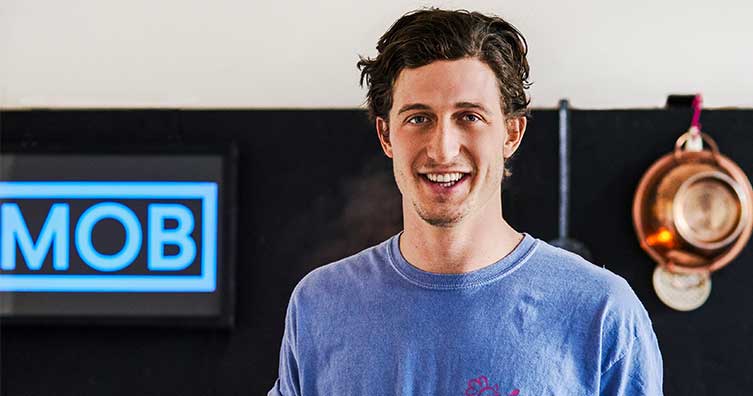
As the founder of the ever-growing and massively popular MOB Kitchen, Ben Lebus is very familiar with the highs and lows of starting a business.
We sat down to chat with him about everything from his experiences of student cooking, entrepreneurship and the importance of paying interns(!). Read on for some incredible tips on making a new business work as a recent graduate.
Ben Lebus on starting MOB Kitchen
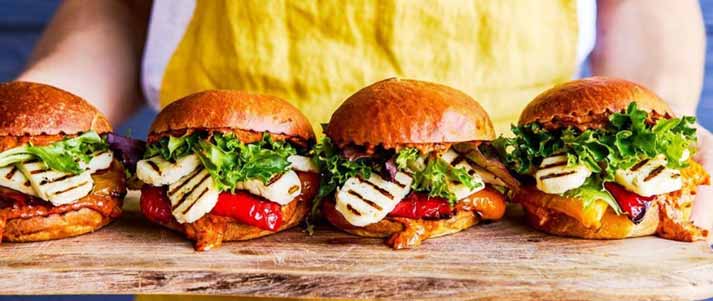
Credit: MOB Kitchen – Instagram
Ben Lebus has always been a foodie.
His dad ran an Italian restaurant for 15 years, so food and cooking were big parts of his life growing up. But, when he arrived at the University of Edinburgh as a student, he realised that not all students felt the same way.
It's always been a real passion of mine, but I could see that that passion wasn't shared by everyone.
They weren't going to Jamie Oliver, they weren't going to BBC Good Food, they weren't going to the spaces that I naturally went to, and I felt that there was a kind of gap in the market for a space that spoke almost exclusively to students and young professionals.
That gap in the market happened to be a MOB-shaped hole, sparking his initial idea.
I set up MOB Kitchen because I was aware that my friends and contemporaries at university weren't cooking a variety of different dishes.
They weren't getting excited about food, feeling confident in the kitchen, and I wanted to create something that would be a specific space for them [...] to go to when they wanted to cook.
Starting a business as a recent graduate
Ben Lebus began working on the launch of MOB Kitchen straight after leaving university, filming the first batch of recipe videos in the summer after his final exams.
However, when we asked him if he'd always planned to set up a business like MOB Kitchen after university, he told us:
I had no idea. I was at university and just didn't know what I wanted to do at all.
I was terrified when all of my friends were getting involved in finding internships and filling out application forms.
I found that very overwhelming because I just didn't even know where to begin.
The idea of getting started in a career in which I had no real interest. I just found very difficult and I guess I got quite lucky in that I found that I had this idea that there needed to be this space online.
Getting by financially when starting a business
When launching a company as a recent graduate, money is always going to be a struggle until you receive funding. So how did Ben manage his money in the early days of MOB Kitchen?
I lived at home with mum and dad [...] so that was a big thing for me.
I feel very lucky that I was able to do that. I feel they were very patient, they were very accommodating.
As a young entrepreneur, he did have to make some sacrifices at first:
I didn't really have anything of a social life or a girlfriend or anything for that first year.
I was so adamant in the belief that MOB was going to work that I also didn't want to get a full-time job.
I believed that, in order to get it there, I needed to give it my full-time dedication.
I did become a Deliveroo rider just to earn extra money to be able to go and see my mates, but apart from that, I was just living at home and hoping for the best.
Entrepreneurship at school and university
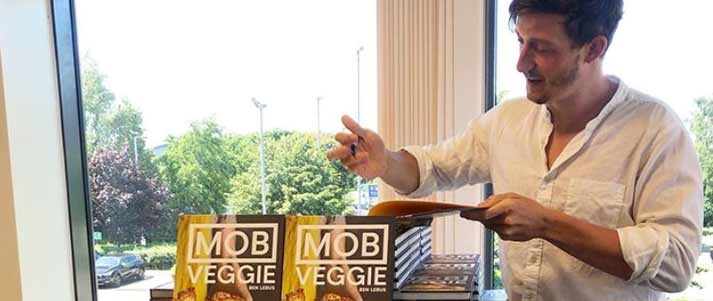
Credit: MOB Kitchen – Instagram
Entrepreneurship seems pretty natural to Ben Lebus.
His first business venture was when he was a teenager, "probably 14 or 15". He came up with a (frankly inspired) idea to sell advertising spaces on water bottles to companies. He'd then give the bottles to taxi drivers, who would, in turn, give the bottles to their customers.
I can remember being really super into it and loving all the calls and the emails and that kind of thing.
Then, when he got to uni, he worked on another big entrepreneurial project with a friend which he described as a "startup art gallery". Together, they put on three large-scale exhibitions to promote the work of young artists.
In his free time at uni, Ben also managed to fit in internships to gain work experience.
Internships were my big thing, [...] always keeping an ear to the ground about opportunities that were in line with the industry that I was thinking about going into.
And this brings us to our next point...
The importance of paying interns
Before speaking to Ben, we were very happy to see an advert for a paid summer internship on MOB's Instagram.
It's not always easy for students to find paid internships, but we asked Ben why it was important to him that his interns were paid.
I did a couple of internships where I wasn't paid, and I think it's a complete disgrace.
[Interns are] coming and they're not on a contract or anything. I feel like that doesn't mean you should be able to abuse that power.
They're coming and working for you, and actually they're also doing jobs that are probably the least desirable jobs there.
[MOB's intern is] often doing the washing up or the shopping and that would just suck if you're not getting paid for that.
We couldn't agree more. If you do find yourself on any unpaid internships, check out our guide to getting by financially during them.
MOB Veggie
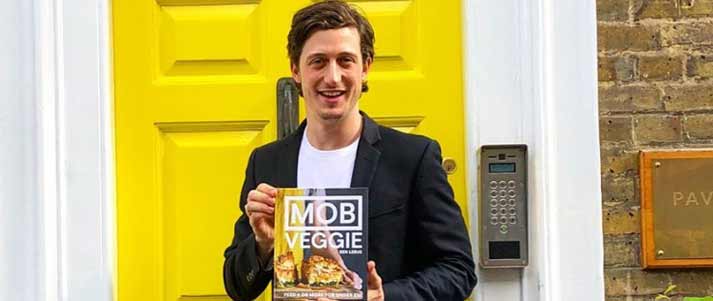
Credit: MOB Kitchen – Instagram
As the second of their two cookbooks, MOB Veggie is helping students to cut down (or cut out!) their meat intake.
Interestingly, MOB Kitchen has found that around 90% of their community are meat-eaters, but they've noticed a distinct interest from many of their followers in having a more 'flexitarian' diet.
Lots of them are kind of interested in taking up a more veggie-based diet.
That was really the aim of the book, to be able to provide them with some exciting alternatives that they could use a couple of days a week in order to cut down on the amount of meat they were eating.
MOB Veggie comes with their iconic tagline, "Feed four or more for under £10". It shows that their delicious (and visually beautiful) recipes don't have to break the bank.
Tips on saving money on food and reducing waste
One of the reasons that Ben thinks MOB Kitchen has become such a hit with students is that their recipes are "created with affordability in mind".
On average, students spend around £133 a month on groceries, but there are ways for you to cut down the cost.
Ben's favourite money-saving technique for buying food is going to big supermarkets.
At smaller supermarkets, it's generally more expensive to buy things like fruit and vegetables, and it can also be more wasteful.
If you've got a recipe, definitely if you're only feeding one or two, [...] it will normally call for like one red onion or one sweet potato or a courgette or an aubergine. Often these ingredients [...] are ones you can't buy a singular version of if you go to the small Tesco Metro, Sainsbury's Local.
They'll come in a pack of three, which is also much more plastic and packaging.
So what are the benefits of bigger supermarkets?
If you go to the bigger supermarkets, you can buy one of each, you can be much more specific for the recipe you're wanting to cook for. You're not going to be left with a lone courgette and a lone onion.
While there are so many tips online to help you use those vegetables, in reality, sadly the case is that more often than not they get chucked in the bin.
Buying individual, unwrapped veg will mean you're only buying the food you really need. Have a look at our guide for more advice on saving money on food.
EARTH MOB: Reduce waste, spend less, be sustainable
One of the latest MOB Kitchen books, 'Earth MOB' aims to help you cook more sustainably and cut down on food waste, while saving money.
It has some great info about key sustainability issues with food, such as the impact of overfishing and habitat destruction on sea life. And it also recommends swaps that you can make in your diet to find more environmentally friendly eating habits.
Plus, if you're unsure how to use up your leftovers, it has some tasty suggestions (banana ice cream, anyone?).
How to start a successful business
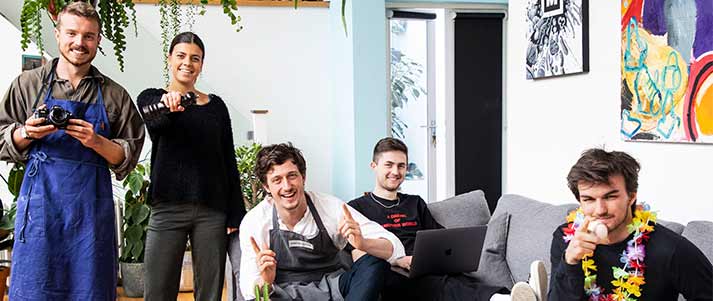
Hoping to follow in Ben's footsteps?
He gave us his top tips for starting a business as a student or recent graduate:
Obviously, the idea is key at the beginning.
Seek lots of advice, do a lot of research about the market you're going into, see if anyone's doing anything similar and then seek a lot of advice from your friends and your family.
Get people's opinions on things and then, once [...] you've come up with a name, you've come up with some branding, always keep seeking advice.
Advice from others is vital when starting a business, but try not to get overwhelmed when you're given conflicting suggestions:
I always ask everyone for their advice on everything, and you will get so many differing opinions.
Be open to hearing advice from people, but also be true to what you know yourself and have an idea – and a strong idea – of what you want yourself and don't necessarily be wavered based on the things that other people are saying.
Just use them as kind of steering or guidelines.
Getting through difficult times with the business
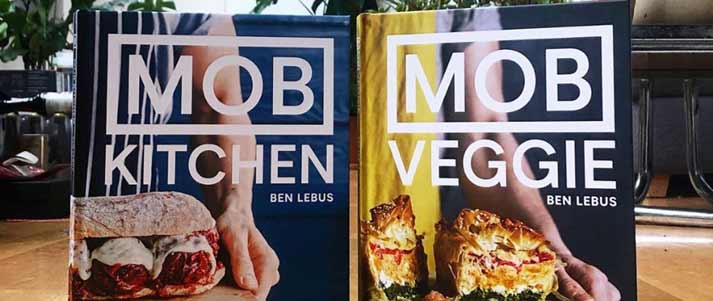
Credit: MOB Kitchen – Instagram
Launching a new business is never plain sailing. Ben Lebus said there were "about three or four times" when running MOB Kitchen felt particularly tough.
I've had moments where I've believed that we've needed to change direction.
More often than not that hasn't actually happened, and it's just meant that I'm left in the situation that I'm in and I'm just like, 'I've got to find a way that I can make this work'.
Ben's fundamental belief in the potential of MOB Kitchen has helped him pull through when things have been difficult.
Just having that belief means that that's something I'd never walk away from.
His determination's clearly paid off, as you can see from the success of their Instagram, Facebook and Twitter. And, of course, the MOB Kitchen cookbooks:
You don't have to spend a fortune to eat your favourite meals. Find out how one student recreates takeaways at home for just £2.








